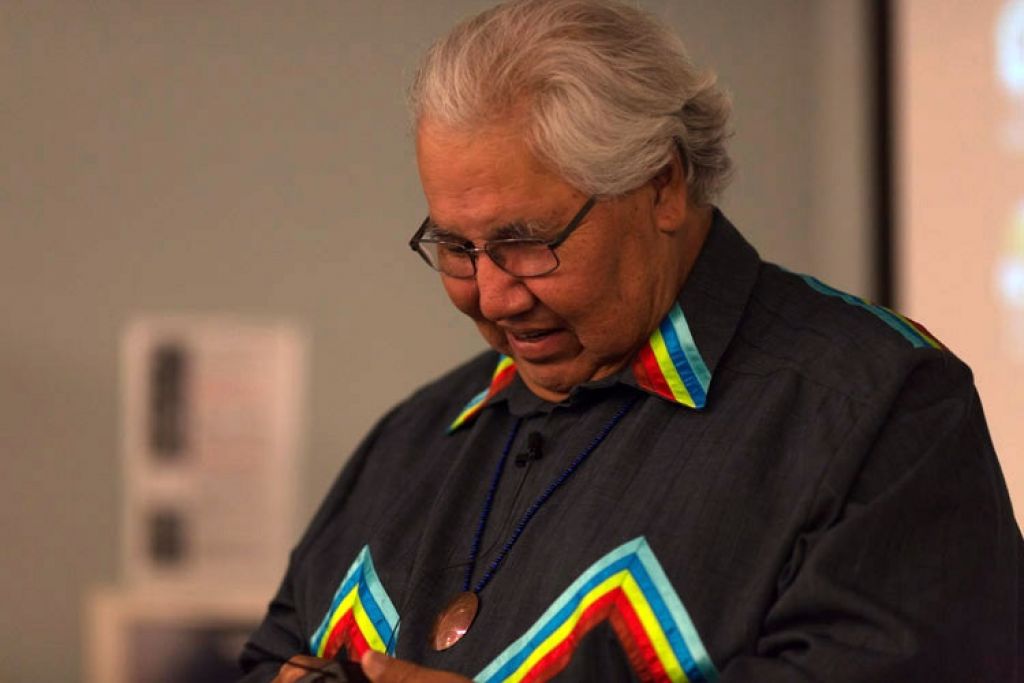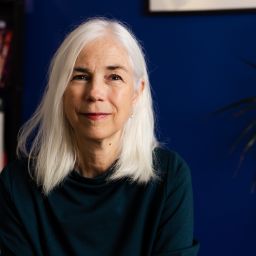The Canadian Centre for Policy Alternatives joins the rest of Canada in honouring the life and legacy of Murray Sinclair: Anishinaabe leader, jurist, senator, and head commissioner of Canada’s Truth and Reconciliation Commission.
Justice Sinclair, whose spirit name is Mizhana Gheezhik—The One Who Speaks of Pictures in the Sky—passed away on November 4, 2024 in Winnipeg at age 73.
He was a visionary—a groundbreaking Indigenous lawyer whose life’s work illuminated the devastating impacts of Canada’s colonial history on Indigenous Peoples and revealed a vision of Canada founded on truth, justice and reconciliation.
Over the years, Justice Sinclair generously shared his time and expertise to speak at events hosted by the Canadian Centre for Policy Alternatives.
In 2011, he gave a talk at the annual CCPA Manitoba fundraiser titled “Understanding a Legacy,” where he dispelled myths and highlighted the strength and leadership in Indigenous communities.
In 2017, he delivered the keynote talk at the CCPA BC’s 20th anniversary gala, entitled “The Truth is Hard. Reconciliation is Harder,” which explained why Canada must change the way we do things and embark on the road to reconciliation.
The CCPA is honoured to have convened a space for Canadians to learn from Justice Sinclair’s wisdom. His voice continues to permeate the perspectives and analysis of progressive movements across this country.
A member of the Peguis First Nation, Justice Sinclair was raised by his grandparents on the former St. Peter’s Indian Reserve near Selkirk, Manitoba. An outstanding student, he would go on to become a lawyer in 1979 and the province’s first Indigenous judge in 1988—the second to be named in Canada.
That year, Justice Sinclair was appointed co-commissioner of the Public Inquiry into the Administration of Justice and Aboriginal Peoples of Manitoba. The three-year inquiry into the police shooting of Indigenous leader J.J. Harper and the murder of Helen Betty Osborne “laid bare the systemic racism that still plagues the criminal justice system.”
The report that concluded the commission’s work set out the 296 recommendations that profoundly impact the justice system in Manitoba to this day. It resonated across Canada and was influential in establishing the Gladue principles, which require courts to consider the background of Indigenous offenders when sentencing.
In 2009, Justice Sinclair agreed to lead the Truth and Reconciliation Commission (TRC), which was “mandated to investigate and document the abuse and cultural genocide administered by the federal government and church bodies during the 150 years of Canada’s Indian residential school system.”
Nearly 4,000 Indigenous children are recorded to have died while at the schools. But the ongoing search for children’s graves is now revealing that thousands more certainly died.
Justice Sinclair carried an inspirational level of dedication to the mission of bringing justice for those victimized in the so-called residential schools. He and his co-chairs witnessed the testimonies of more than 6,500 survivors, their families and communities.
The Truth and Reconciliation Commission’s final report was released in 2015. It remains the key blueprint for remedial action—decolonization—yet only 13 of the 94 calls are reported to have been fully implemented as of 2023.
“You have to remember that we’re writing for the future, not just for this government,” Sinclair said at the Truth and Reconciliation Commission report ceremony.
“Our view is that this report is going to have to stand the test of time and when people look back not just at the report today and see how it impacted today, they should also be looking at this report in the future and using it to guide their activities into the future.
“My view and my comment is that being in charge of the TRC and being involved in all of those hearings, and listening to all those survivors, profoundly changed my way of thinking about the government, thinking about Canadian society, and thinking about how far we have to go in order to restore Indigenous peoples’ self-respect,” Justice Sinclair wrote in his autobiography, which was published shortly before his death. “Because we will never achieve reconciliation without self-respect. Reconciliation is about mutual respect.”
In April 2016, Justice Sinclair was appointed to the senate by Prime Minister Justin Trudeau, serving until 2021. In 2016, he said: “I approach this appointment with hope for the future, and remain committed to reconciliation between Indigenous and non-Indigenous people, something I believe in my heart is possible.”
In 2022, he was inducted into the Order of Canada for dedicating his life to “truth, justice and reconciliation” and for championing Indigenous Peoples’ rights and freedoms.
Justice Sinclair recently published his memoir, Who We Are: Four Questions For a Life and a Nation. The book looks at the future for Indigenous Peoples and non-Indigenous people in Canada. It is a must read.
Justice Murray Sinclair fought colonialism with reason, evidence and principles. He challenged Canadians to learn about the very difficult injustices that the state inflicted upon First Nations, Métis and Inuit people and helped to carve out a clear path forward, together. His legacy will live on for generations to come.









